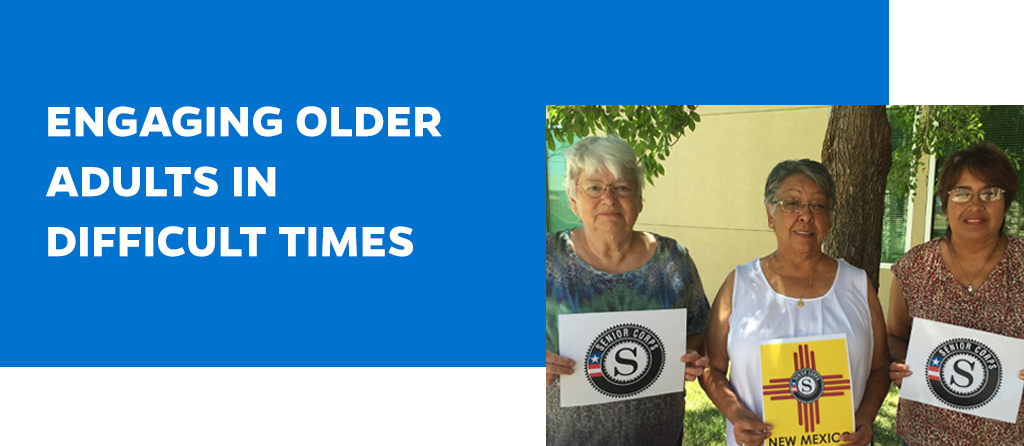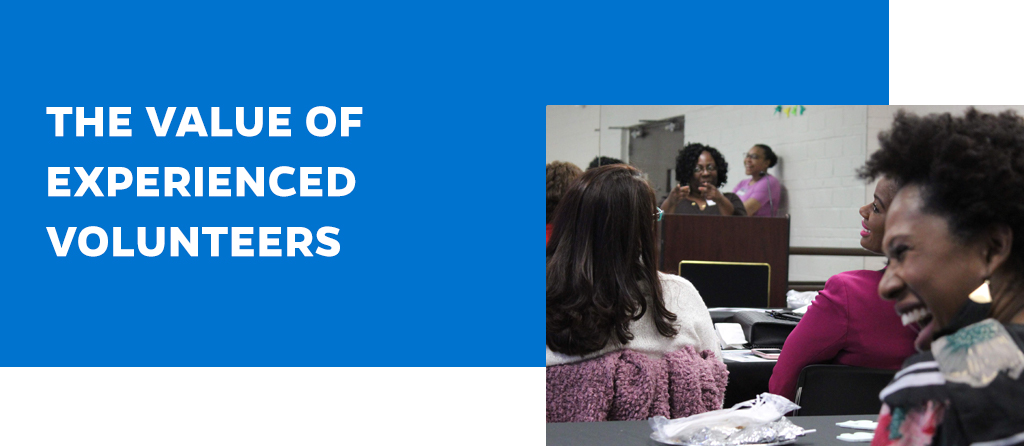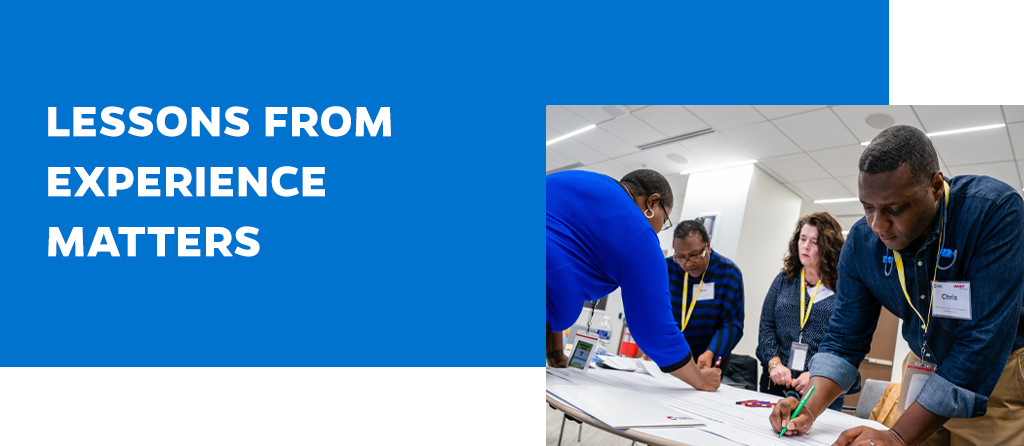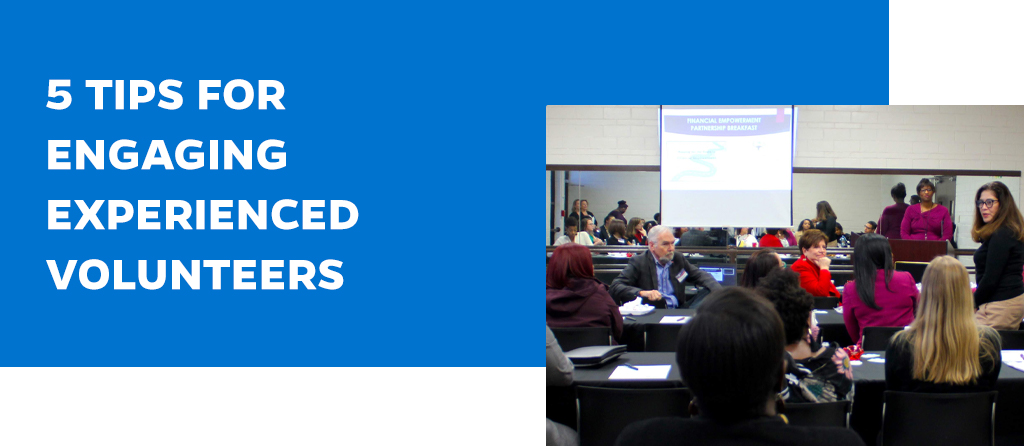Volunteers aged 50+ have much to offer their communities. Many older volunteers have extensive work history and strong relationships in the community, and they tend to donate more of their time than younger residents. To help city leaders better draw on this experience and expertise, Cities of Service launched the Experience Matters program in 2019 in partnership with AARP.
Five participating cities engaged residents aged 50+ to tackle public problems. Each city received $30,000 and technical assistance from Cities of Service. Full-time AmeriCorps VISTA members served in each city hall to build capacity and raise awareness for the initiatives.
In addition to providing funding and technical assistance to cities throughout the duration of the program, Cities of Service helped recruit and select AmeriCorps VISTA members, provided pre-program training, assisted with project design, and offered expert and peer-learning opportunities.
The program launched in 2019, and when the COVID-19 pandemic arrived in early 2020, it forced city leaders to adjust their approach to working with experienced volunteers and, in many cases, redesign their programs. The Cities of Service team worked alongside city staff to assess the options in light of health and safety restrictions and new budget and staff constraints, and pivot as needed.
Overview
This report outlines the activities and impact of the Experience Matters program and shares lessons that can inform future work with older volunteers. These include:
- how cities participating in the Experience Matters program have engaged older adults during the pandemic;
- the skills, relationships, and time that experienced volunteers can bring to their cities, and how to make the most of those assets;
- the need for thoughtful partnerships and messaging when engaging resident volunteers, especially those aged 50+; and practical tips for local leaders engaging older volunteers.
Remaining flexible and creative was key to the success of the Experience Matters program. In the face of the enormous challenges presented by COVID-19, city leaders were still able to draw on the strengths of adults aged 50+ and their desire to contribute to their communities.
The Experience Matters AmeriCorps VISTA members played an important role in the early months of the pandemic, helping to coordinate the program and assist with relief efforts. Cities created virtual programs to safely engage residents during this time. They adjusted partnerships with community organizations to address the changing needs of the community, including the distribution of personal protective equipment, food, and medication to vulnerable residents. Program leaders also had to contend with budget cuts and reduced staff time despite increased demands. And yet, throughout these changes, older volunteers continued to give their time and talents.
Each of these projects had to adapt to changing circumstances. Those adaptations revealed new perspectives on persistent themes in 50+ volunteerism and led to new insights that can inform future work.

Understanding the Needs of Older Volunteers in Albuquerque, New Mexico
Mayor Tim Keller created the Office of Civic Engagement in 2019 to grow the One Albuquerque Volunteers initiative into a city-wide volunteer hub working across departments. The pandemic highlighted the need for robust virtual engagement, and the city decided to focus on better understanding the needs of older volunteers and improving their volunteer system, processes, and support materials with a data-informed approach.
The city recruited older adults from their Retired & Senior Volunteer Program-some of whom had never used Zoom-to participate in a study of the city’s digital platforms and online resources. These volunteers used the portal and other technology and provided ongoing feedback about their experience. The results will lead to better engagement with older volunteers and will move the city closer to receiving an Age Friendly designation from AARP and the World Health Organization.
The city plans to improve their training and online resources by adding additional visual aids and video instructions, and will install new tablets at city facilities where residents can register to volunteer and log their volunteer hours. The changes will also help the Office of Civic Engagement work more closely with the Department of Senior Affairs (DSA). The streamlined process informed by the study will make it easier for the DSA to manage volunteers using the One Albuquerque hub and remove barriers to volunteering.
Reaching Residents Through Trusted Partners in Birmingham, Alabama
Experience Matters in Birmingham sought to reduce the financial burden on residents who were spending a disproportionate amount of their income on energy costs and struggling to pay their bills. The city planned to activate volunteers, with a focus on those aged 50+, to provide workshops and repairs to help residents improve energy efficiency in their homes. The city conducted a workshop attended by more than 60 residents. Partner organizations, such as Allstate, Valley National Bank, and Sil-LoH Metro Realty Brokers, presented to the assembled residents on topics including homeowners insurance, the importance of saving, remodeling techniques, and more.
After the workshop concluded in February 2020, COVID-19 forced the city to cancel their plans for in-home repairs. Budget cuts due to the pandemic further reduced capacity to manage the Experience Matters program.
In order to increase their capacity, the city used program funds to partner with Positive Maturity, a local nonprofit that supports and engages seniors.
Through the partnership, they recruited nearly 50 new volunteers and reactivated another 40 volunteers—all aged 50+— for local nonprofits, such as Meals on Wheels. Resident volunteers recruited through the program also served as Senior Companions, providing housekeeping, meal preparation, and companionship for vulnerable individuals sheltering in place due to COVID-19 and other health conditions. Other volunteers served as Foster Grandparents, writing letters to children and later visiting them when it became safe to do so.
Connecting 50+ Residents To City Resources in Columbia, South Carolina
In Columbia, the Experience Matters team focused on the neighborhoods with the highest crime rates and lowest income, and planned to provide youth in these neighborhoods with strong, positive relationships by recruiting volunteers aged 50+ to act as mentors. The city led a user-centered design process to create their intergenerational program. Over nine meetings and events, potential mentors and mentees were consulted for input to make sure the program design was compelling for all participants.
When COVID-19 disrupted the program, city leaders shifted their focus to understanding the needs of older adults. The city partnered with a nonprofit organization called SC Thrives to work with youth volunteers participating in the Mayor’s Fellows Program. They made cold calls to local seniors in order to better understand what support they needed during the pandemic and inform them about available resources. The fellowship included a stipend for their work and also provided professional development opportunities for the participating youth, including regular check-in calls with the SC Thrives staff to discuss professionalism, multitasking, and other important workplace skills.
SC Thrive created an online portal, called Thrive Hub, to collect data and enable the city to better connect with residents aged 50+. The program will continue as an ongoing partnership between the Mayor’s Fellows Program and SC Thrive, and the fellows will continue to check-in on older residents, with an immediate focus on encouraging COVID-19 vaccinations.
Promoting Volunteers Powered Financial Health in Fort Worth, Texas
The Experience Matters program in Fort Worth sought to support the large number of residents with low credit scores and debt over 60 days past due. The city partnered with Pathfinders, a local nonprofit dedicated to promoting the financial empowerment of residents, to pilot a Match Savings Program and train volunteers as financial coaches.
The Match Savings Program matched up to $200 deposited by participating residents into their savings accounts. Residents also received financial coaching provided by trained volunteers.
During the first 3 months of the pilot, 14 participants opened a new savings account and saved over $200, which was matched by the city.
Having $400 in savings can be the difference between losing a house or a job due to unforeseen expenses such as car repairs and medical expenses.
To supplement the savings program pilot and make critical financial information available to more residents, the city provided virtual financial education about topics such as financial health, managing credit and debt, and predatory lending. These workshops were initially planned to be in-person but were moved online when the pandemic hit.
The Experience Matters AmeriCorps VISTA member, Coletta Strickland, who had extensive experience in financial education, played an important role in organizing and leading the workshops. Fort Worth City Credit Union, Frost Bank, GM Financial, and PNC Bank led workshops on topics such as banking, budgeting, credit, identity theft, higher education, home buying, and more.
Leveraging the Skills of Older Residents in Saint Paul, Minnesota
The Experience Matters team in Saint Paul initially focused on the financial strain that housing code violations put on residents with low incomes. Using a collaborative design process, the city identified all the citizen interactions associated with water fines, such as receiving a notice from the city about high water usage, across multiple departments.
This exercise pinpointed the opportunities for volunteers to help homeowners resolve their issues and avoid fines. The Mayor’s Advisory Council on Aging was also consulted as the program plan was being developed. This group, mostly made up of individuals aged 50+, provided a number of valuable recommendations based on their experience identifying the needs and recognizing the contributions of seniors. As a result of their feedback, the city improved volunteer appreciation plans and simplified their print materials.
The city recognized a growing need for volunteers in the wake of COVID-19. Despite the heightened risk, many older volunteers were volunteering to help distribute food, medicine, and personal protective equipment. The Experience Matters AmeriCorps VISTA member, Jack Smyth, helped recruit residents during the early months of the pandemic and match them with organizations in need of volunteers, while also ensuring that safety precautions were taken.
During the early months of the pandemic, the city connected nearly 200 volunteers to frontline non-profits, including 70 volunteers aged 50+. Volunteers provided administrative support, sewed masks, prepared meals, shelved food, and delivered meals.
Responding to an increase in homelessness during the health crises, the city also worked with Listening House—a community and resource referral center for individuals experiencing homelessness, loneliness, and poverty—to identify volunteer opportunities.
These included direct interactions with day shelter guests and developing a way to track inventory, like clothing and hygiene products, distributed to guests. To date, 20 individuals experiencing homelessness have been placed in other housing.
Due to the success of these efforts and the cross-departmental project to reduce housing code violations, city departments that typically do not work with volunteers, such as the Safety and Inspections Department, became increasingly open to doing so. The Experience Matters team hopes to continue to find new ways that 50+ resident volunteers can help the city address public problems.

The skills, relationships, and time that volunteers aged 50+ bring to their volunteer work make them an important and powerful partner for every city.
When local leaders think strategically about the role of 50+ residents in their volunteer initiatives, they can channel the passion older adults have for improving the places where they live and work.
Cities participating in the Experience Matters program found ways to make the most of their older volunteers, drawing on their skills and desire to serve. By keeping the strengths and capabilities of older adults in mind when designing initiatives, local leaders ensured that volunteers aged 50+ were effective and valued participants.
Skills
Most older volunteers have many years of work behind them. Some may be retired after long careers and have high-level experience. These skills can be highly useful in a variety of situations, such as when city staff are working to solve difficult problems that may require technical or management expertise.
Colletta Strickland, for example, had been teaching workshops on financial health for many years when she became an Experience Matters AmeriCorps VISTA member in Fort Worth. This made it easy for her to organize and facilitate workshops. It also helped in other ways. When the team used the term “financial literacy,” she knew from experience that residents don’t like the implication that they are somehow illiterate. So they started talking about “financial health.”
Dwight Robarts, a retired nonprofit executive, began volunteering through the city’s program partner, Pathfinders. He brought with him a life-long interest in personal finance and a passion for teaching others. After completing training with Pathfinders, he began as a volunteer financial coach. With his background in nonprofit management and volunteer history with a local domestic violence program, Dwight was a natural fit for working with families striving to improve their financial circumstances. Many of Dwight’s coaching participants have completed the Savings Match Program, contributing $200 which was matched with funds from the city, leaving them in a much more stable financial situation.
Relationships
Creating strong ties in the community takes time and effort. Experienced volunteers often bring these ties with them, creating another way for city staff to connect with residents and partners.
For example, Kimberly Braden, an Experience Matters AmeriCorps VISTA member, had worked in the nonprofit sector for years and was a long-time resident of Birmingham. She used her ties to Birmingham organizations, such as the local chapter of AllState, to recruit partners to teach financial education workshops for residents.
Coletta Strickland likewise has lived in the Fort Worth area for many years, and is the president of the Minority Leaders and Citizen Council. Through that relationship, she brought potential volunteers aged 50+ to the city’s Experience Matters program. The city also found that volunteer mentors for its financial coaching initiative often recruited their neighbors to serve as mentors, creating additional opportunities for the city to engage new volunteers.
Time
It is important to appropriately value the amount of time older volunteers contribute to their communities. Even during COVID-19, when older individuals were at greater risk of serious illness from the disease, older adults continued to volunteer.
More than 15,000 people registered for One Albuquerque, the city’s volunteer hub, are over 50 years old. This is by far the largest proportion of volunteers in the city. And in Saint Paul, city staff observed that older volunteers contributed nearly twice as many hours as younger volunteers.
Fort Worth found that volunteers over the age of 55 are often retired and have greater flexibility in their schedule. This, coupled with their leadership, executive, and financial experience, means their time is quite valuable. The city estimates that this experience would generally cost more than $100 per hour if solicited in the private sector.

Meeting the challenges presented by the pandemic required flexibility, creativity, and persistence from city leaders and the staff of Cities of Service.
Thoughtful Partnerships Help City Hall Do More
Thoughtful Partnerships Help City Hall Do More Changing priorities, budgets, and staff capacity during the pandemic made thoughtful partnership especially important. Intentionally designing and adjusting partnerships helped cities make the most of these relationships and better play to their strengths.
In Fort Worth, a number of financial institutions had guidelines and propriety constraints about the information that could be shared in public workshops and the size of the audience they could share it with. To navigate this, the city team pulled together a kick-off breakfast with 33 partners to better understand the goals of their Experience Matters program and identify their respective roles. As a result, the city established two tracks for community partners: one-time workshops and the Match Savings Program pilot. Establishing multiple pathways for partners to contribute to the collective goal of financial health allowed multiple partners to participate in the workshops and identified Pathfinders as a critical partner in the savings pilot.
Recruiting, training, and managing volunteers to serve as financial coaches was beyond the current capacity of Fort Worth staff, so the city partnered with Pathfinders, an organization that specializes in those services. Understanding and relying on the strengths and expertise of its partner allowed the city to effectively allocate resources and accomplish the work rather than reinvent the wheel.
Through the partnership, they have recruited fourteen 50+ volunteers who participated in an 8-hour virtual training about financial coaching in order to help individuals build a sustainable emergency savings fund.
Messaging and Medium Matter When Recruiting Older Volunteers
City staff have found that the best recruitment is typically through personal connections. In Fort Worth, word-of-mouth referrals among current and prospective volunteers created a pipeline of volunteers for its financial coaching program. Similarly, Birmingham discovered that personal phone calls and handwritten notes resulted in the most volunteer placements.
Birmingham also had some success recruiting volunteers with newsletters (both electronic and mailed), which highlighted how to become a volunteer and current volunteer opportunities. The electronic newsletter had a 46 percent open rate, and it helped the partner recruit more than 50 volunteers. The city partner also organized speaking engagements over Zoom and in person at venues such as senior centers, faith-based organizations, and senior residences for independent living. While well-attended and engaging, the Zoom events resulted in fewer volunteer applications compared to in-person events.
Two Heads are Better Than One
While it would have been impossible for local governments to predict a crisis like COVID-19, it did highlight a need for cities to consider assigning a co-lead to long-term citizen engagement programs. Two Experience Matters programs were led by senior staff members without support staff, while the other three were led by staff who were new to their role. In both scenarios, staff did not have an internal partner with whom to strategize and manage changes while responding to the health crisis. In Saint Paul, for example, the program lead became the Director of Community Initiatives, a role which included expanded responsibilities and left less time to focus on the Experience Matters program.
The Cities of Service team played an important role as thought partner and co-strategists during this time. Assigning a co-lead to the project would help further ensure the program continues as planned when there are staff changes and once the grant period ends.

Create volunteer roles that leverage career and life experience.
Older residents naturally use their experience in their volunteer work, but cities can make the best use of this life and career experience by creating volunteer roles that explicitly require particular skills. For example, Cities of Service worked with Saint Paul and their partner organization, Listening House, to develop a volunteer “job” description for a donation inventory specialist. With a much higher volume of donations-such as clothing and hygiene products-coming in and being distributed during the pandemic, the organization needed a way to track it. Fred Krieder, a resident with a background in data management, was assigned the role and is already working on creating an inventory system.
Make training an essential part of volunteer service.
When planning volunteer activities, be sure to include training in your plans. Partners can help, especially when the volunteer activities require special knowledge or deal with sensitive topics. Fort Worth worked with a local partner, Pathfinders, to train volunteer financial coaches. The organization also provided ongoing technical assistance to volunteers as needed. This ensured that volunteers could provide high quality and consistent guidance to residents. Training conducted in groups also helps connect volunteers to each other early on and helps them feel confident, supported, and valued in their efforts.
When appropriate, make sure volunteers have access to necessary technology and technological training.
Several participating cities seeking to educate older adults during the pandemic immediately ran into challenges when some residents did not have access to computers or the internet, or were not familiar with online platforms like Zoom. While most older adults use technology, 40% of those over age 65 do not have access to the internet or smartphones.1 Older adults are also concerned about internet fraud. Partner organizations can help provide training, and community centers and other public spaces can be access points for technology and the internet. In Fort Worth, for example, the city’s IT department provided public WiFi at sites such as community centers and public libraries.
Assess volunteer programs and recruitment with the help of older adults.
Residents can help the city assess their activities and identify areas for improvement. Albuquerque recruited a group of older volunteers to test their volunteer programs and online volunteer portal. Due to their feedback, the city will be using more touch pads in public spaces-which are easier for older adults to us -and improve their volunteer training. They also discovered that 50+ volunteers support each other and connect one another to resources and volunteer opportunities during these interactions. The city plans to translate this awareness into a peer-to-peer based training and orientation program.
Design volunteer opportunities with health concerns and physical abilities in mind.
While the high risk to older adults posed by COVID-19 will not always be an issue, there will always be residents who may not be able to volunteer in person due to health issues, age, or other conditions. The pandemic forced cities to consider these factors, and city staff should continue to do so in the future to draw on the skills and time of residents with all kinds of abilities. In Albuquerque, for example, the city made adjustments to its resources and digital platforms based on resident feedback-increasing the font size, for example, and using additional visuals like screenshots and video. They also installed more touch screens because they were both easier to use and easier to sanitize. These are changes that will continue to benefit older residents, keeping them more involved and safer, even after the pandemic ends.
